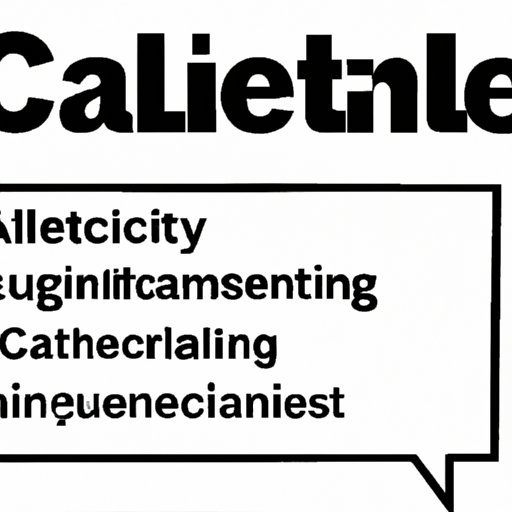Introduction
In recent years, the concept of “cancel culture” has become increasingly prominent in our society, sparking debates about its implications and effects on our culture. But what exactly is cancel culture? Put simply, it’s a form of digital activism that involves publicly shaming or boycotting people who have said or done something deemed to be offensive or problematic. While it’s been met with mixed reactions, there are some aspects of cancel culture that are worth considering and examining more closely.
There are both benefits and challenges associated with cancel culture. On the one hand, it has the potential to bring attention to important issues and hold people accountable for their actions. On the other, it can also be used to target individuals unfairly and lead to an oversimplification of complex topics.

Examining the Benefits of Cancel Culture on Social Justice Movements
Despite the controversy surrounding cancel culture, there are several ways in which it can be beneficial for social justice movements. These include increased visibility and awareness, amplifying marginalized voices, and encouraging accountability.
Increased Visibility and Awareness
One of the primary benefits of cancel culture is that it can help draw attention to important issues. By creating a public outcry against those who have committed wrongdoings, it can help bring these issues to the forefront of public discourse and make them more visible. As Dr. Brooke Foucault Welles, an assistant professor of communication studies at Northeastern University, notes, “When you have a lot of people coming together to say that something is not okay, it does have an impact.”
Amplifying Marginalized Voices
Cancel culture can also be instrumental in amplifying historically marginalized voices. By calling out those who have exhibited oppressive behavior, it gives those who have been impacted by such behavior a platform to speak up and be heard. As Dr. Welles explains, “Cancel culture can be a way for people to push back against systems of power that have excluded and silenced them.”
Encouraging Accountability
Finally, cancel culture can be used as a tool to encourage accountability. By putting pressure on individuals and organizations to take responsibility for their words and actions, it can help create a sense of responsibility and ensure that those responsible for wrongdoings are held accountable.
A Critical Look at How Cancel Culture Has Changed the Way We Talk About Issues
In addition to its potential for social justice movements, cancel culture has also changed the way we talk about certain issues. This includes expanding discourse, emphasizing nuance, and promoting constructive dialogue.
Expanding Discourse
By creating a space for open dialogue and debate, cancel culture has opened up conversations about difficult topics that may have otherwise gone unaddressed. As Dr. Welles points out, “It creates a forum for people to talk about things that they may not have felt comfortable talking about before.” This can be beneficial, as it allows us to confront uncomfortable truths and gain a better understanding of different perspectives.
Emphasizing Nuance
Cancel culture has also helped to emphasize the importance of nuance when discussing controversial topics. Rather than relying on simplistic, black-and-white thinking, it encourages us to think critically and consider multiple sides of an issue. As Dr. Welles explains, “It can be a way to foster more nuanced conversations about complex topics.”
Promoting Constructive Dialogue
Finally, cancel culture can be used to promote constructive dialogue. By creating a platform for meaningful conversations, it can help us move past the superficial rhetoric that often characterizes online debates and instead focus on finding solutions to difficult problems.

Exploring the Role of Cancel Culture in Holding People Accountable for Their Actions
While cancel culture has its drawbacks, it can also be effective in holding people accountable for their actions. This includes creating consequences for harmful behavior, encouraging positive change, and allowing for healing and growth.
Creating Consequences for Harmful Behavior
At its core, cancel culture is a form of accountability. By publicly shaming those who have committed wrongdoings, it can create tangible consequences and discourage further bad behavior. As Dr. Welles explains, “Cancel culture can be a way to shift the balance of power in situations where people have traditionally been able to get away with bad behavior.”
Encouraging Positive Change
Cancel culture can also be used as a tool for positive change. By forcing people to confront their mistakes, it can help them learn from their errors and take steps to improve themselves. As Dr. Welles notes, “It can be a way for people to reflect on their behavior and start to make changes for the better.”
Allowing for Healing & Growth
Finally, cancel culture can provide an opportunity for healing and growth. By creating a space for dialogue, it can help us move past our differences and find common ground. As Dr. Welles explains, “It can be a way to bridge divides and allow for more meaningful conversations.”

Analyzing the Impact of Cancel Culture on Free Speech and Expression
The debate over cancel culture also raises questions about free speech and expression. In particular, it forces us to consider the balance between rights and responsibilities, the pros and cons of self-regulation, and the need for balance.
Rights vs Responsibilities
One of the key issues raised by cancel culture is the tension between our right to free speech and our responsibility to use it responsibly. While freedom of expression is essential for a healthy democracy, it must be balanced with respect for others and an understanding of the potential consequences of our words and actions.
The Pros & Cons of Self-Regulation
Another important consideration is the role of self-regulation in regulating speech and expression. While it can be an effective tool for preventing abuse and promoting accountability, it can also be used to silence dissenting voices and stifle meaningful dialogue.
The Need for Balance
Ultimately, the goal should be to strike a balance between free speech and responsible expression. As Dr. Welles argues, “We need to make sure that we’re creating a culture that values free expression but also encourages people to think critically about the consequences of their words and actions.”
Investigating the Pros and Cons of Cancel Culture in Today’s Society
As with any phenomenon, cancel culture has both its advantages and disadvantages. Some of the potential risks and drawbacks of this trend include potential for abuse, questioning intentions, and importance of context.
Potential for Abuse
One of the main criticisms of cancel culture is that it can be vulnerable to abuse. By leaving room for misinterpretation and manipulation, it can be used as a weapon to target individuals unfairly and without due process. As Dr. Welles explains, “We need to be aware of the potential for cancel culture to be used as a tool for harassment, bullying, and silencing.”
Questioning Intentions
When engaging in cancel culture, it’s important to question the intentions behind it. While it can be a powerful tool for social justice, it should never be used as a means to punish or attack someone for expressing their opinion. As Dr. Welles argues, “We need to be mindful of our motivations and make sure that we’re not just trying to shame or silence someone for disagreeing with us.”
Importance of Context
Finally, it’s important to remember that cancel culture should always be considered within the context of the situation. Different circumstances require different approaches, and it’s essential to take into account all relevant factors before making any judgments.
Conclusion
Cancel culture has become increasingly prominent in today’s society, sparking debates about its implications and effects. While it has its drawbacks, there are also several potential benefits, from increased visibility and awareness of social justice movements to encouraging accountability and holding people responsible for their actions. Ultimately, it’s important to consider the pros and cons of this phenomenon and strive to strike a balance between free speech and responsible expression.
(Note: Is this article not meeting your expectations? Do you have knowledge or insights to share? Unlock new opportunities and expand your reach by joining our authors team. Click Registration to join us and share your expertise with our readers.)
